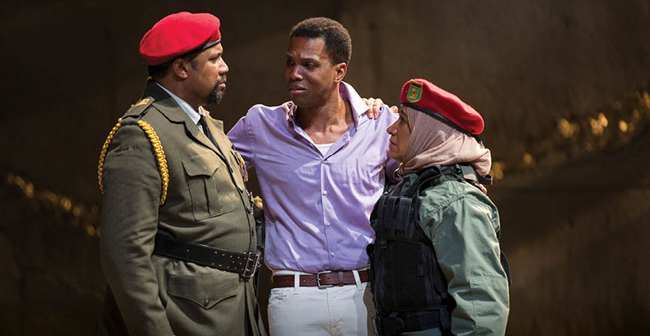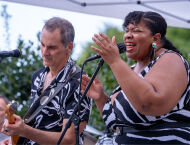Culture
 Photo: Scott Suchman
Photo: Scott Suchman
Why Do They Fight? Motive and Murder in ‘Macbeth’
May 22, 2017 @ 12:00am
In Shakespeare Theatre Company’s Macbeth, machetes and machine guns replace broadswords and daggers, while characters wear military fatigues rather than kilts and ruffs. The spare and stunning set, designed by John Coyne and Colin K. Bills, uses towering columns of color-changing neon to create mood and define space. Perhaps most provocative, the witches have transformed into intelligence officers, feeding Macbeth the information that incites his every violent act.
“If you’re going to do this play, [then] challenge the audience to say, ‘This isn’t them, it’s us,’” explains McKinley Belcher III, who plays Banquo, Macbeth’s trusted friend who falls victim to his hunger for power.
Director Liesl Tommy and her team of production designers updated the look and feel of the play, at Shakespeare’s Sidney Harman Hall through May 28, to provide commentary on mankind’s lust for violence.
“Unfortunately, bloodshed has been a way of the world,” says Marcus Naylor, who plays Macduff, the man ultimately responsible for the end of Macbeth’s reign. “The ones who have the bigger guns and more money will go and take, but when people believe in a higher thing, be it God or whatever your thing is, they will fight to the death.”
From the prologue battle scene involving nearly the entire cast to individual assassinations, the fight scenes in this production are elaborate and unnerving. Choreographed by Rick Sordelet and Christian Kelley-Sordelet, each fight pushes the envelope.
“One thing that Rick said very early on is that there are tons of fight choreographers who can choreograph a safe fight, but the audience will never for a second believe that they were fighting,” Naylor says. “Our job is to sell that illusion, but to sell it safely.”
Belcher explains, “They build each fight based on the actors’ bodies. One thing I haven’t seen a lot in fights I’ve done in other places is the trust between [Liesl] and Christian and Rick. It’s not like the storytelling stops when we start fighting.”
Naylor adds, “With Rick, what I love about him is that he does his work from an actor’s point of view. He understands the actor’s process, if you will, which helps us to relax.”
Preparation involved two weeks of intensive boot camp, teaching the actors how to move as inspired by modern military tactics.
“Once we had that foundation laid, we started putting together fights based on what the character’s experience level would be, how athletic he would be, and the demands of the storytelling that Shakespeare wrote,” says Corey Allen, who plays Malcolm, heir to the throne.
He also served as fight captain for the production.
“There’s a lot of interpersonal conflict,” Allen says. “There’s the state versus the rebels, there’s husband versus wife, adults killing children. We had to figure out a vocabulary of movement for each of those things.”
The Sordelets established the moves and stayed through tech, then Allen took over to ensure the integrity of the choreography and to keep the actors safe.
“Because we’re using knives and machetes, and there are punches and slaps in the play, if we’re not constantly making sure we’re doing the choreography exactly as it was [designed], you run the risk of getting injured,” Allen says. “Early on, Macbeth actually was stabbed in an accident while we’re rehearsing.”
Yes, the blades are real. Dulled, but real.
“If it’s a competition between a [body] and a knife, the knife will always win,” says Belcher, laughing.
He then continues, “My favorite fight in this show is the one I have with my son. It’s just a little hand-to-hand wrestling. What I like about working with Christian is that it’s always rooted in the story…you get to see a tender moment between father and son. You see both instruction – him having fun – but also trying to prepare him for a world that he’s going to have to enter, eventually. It’s exciting to me because it’s not something that’s necessarily fully [brought] out in Shakespeare’s play, but we get to sort of open their daily lives to the audience. They get to see who [the characters really] are.”
When Belcher’s character, Banquo, is brutally murdered by child soldiers under the orders of a paranoid Macbeth, his bloody ghost follows the instigator and once dear friend throughout the remainder of the play, torturing him with blame and guilt.
“So much of [the violence] is cause and effect, protecting one’s legacy, and unfortunately, death is a part of the resurrection of what has to take place,” Naylor says. “For example, there is so much that has to happen for Malcolm to become king. It’s justifiable in that way.”
“It’s an interesting thing to think about war,” Allen says. “Why does each man fight?”
“Macbeth is fighting for power and to move up the ladder, while Banquo is fighting to protect his child – to make a world where his child can be safe,” Belcher adds.
“Even the character of Malcolm, who is sheltered, is spurned,” Naylor says. “What maybe he was protected from at one time – that thing in him, that killer in him – has to give birth to the thing that is in man. It is in mankind.”
“Liesl did a great job of teasing out each [man’s] story,” he continues. “Violence ricochets throughout the play. When Macbeth comes into power, he has a staff of three people at his house who continue to work for him. His relationship with them changes [throughout the story]. It becomes more violent. The more paranoid he becomes, the more abusive he becomes. The relationship with his wife becomes more violent, and although they don’t strike one another, the way they interact with each other becomes more violent.”
Naylor also describes the sobering existence of child soldiers in the play, who start out as “goofy kids, and in the course of two hours, they become like jackals, killers. The exposure to violence can completely alter the course of a person’s life. I think that’s what this play is about. Our director was committed to not shy away from any of that.”
Allen adds, “I think it would be irresponsible to not comment on the current political climate that we find ourselves in, not to say that this production is directly a result of that. It’s interesting to be doing this play in Washington, DC, where there is so much uncertainty. And so much of the language in the play sounds like it could have been written by someone today. We’re talking about what leadership is, what ambition is, what betrayal is, what it means to be an upright person who will stand up even if you lose your life for what you think is right. That’s reason enough for people to be in the seats watching. Shakespeare wrote this play a long time ago, but there’s a lot for us to mine.”
“I hope audiences are thinking, ‘What is my social responsibility?’” Belcher says, “and just being more vigilant about holding our leaders responsible.”
Macbeth runs through May 28 at Sidney Harman Hall, across from the Gallery Place Metro stop. Tickets are available here.
Shakespeare Theatre: 610 F St. NW, DC; 202-547-3230; www.shakespearetheatre.org







